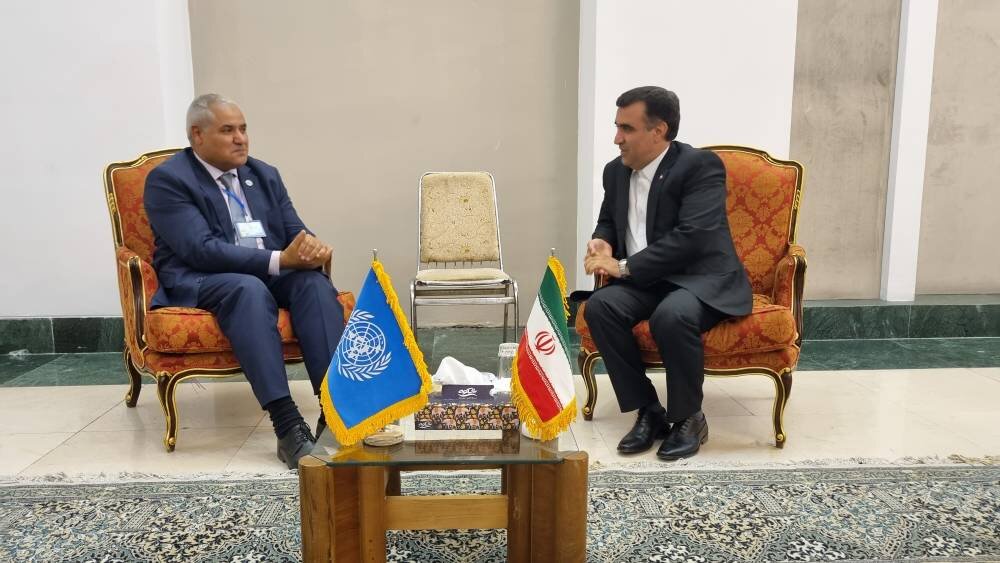DOE calls for FAO’s aid to restore Zagros Forest

TEHRAN- The head of the Department of Environment (DOE), Ali Salajeqeh, in a meeting with the assistant director-general of the Food and Agriculture Organization of the United Nations (FAO), AbdulHakim Elwaer, asked for FAO's contribution to reviving Zagros Forest.
The meeting was held on the sidelines of the international conference on battling sand and dust storms which was held in Tehran on September 9-10.
Zagros Forest is among the most important natural resources of Iran, as it constitutes 40 percent of the country's jungles, and plays an important role in the production of a large part of the country’s freshwater.
Referring to the unfavorable conditions of Zagros Forest due to the pest infestation and lack of water, Salajeqeh said, “We expect FAO to help us deal with this problem.”
He added: “Due to climate change, it's getting more and more difficult to supply food. We hope everyone has access to healthy food and not a larger number of people live below the poverty line.”
“Protecting the environment is protecting life. Food security and life security are not two different issues. We expect FAO to adopt proper policies to provide the food needed by the people of the world through [promoting] agriculture, industry, and so on.”
Salajeqeh also called on FAO to work more seriously to reduce the use of pesticides and fertilizers and also to provide more support to the international effort to combat sand and dust storms.
Elwaer, for his part, said that holding the international conference on sand and dust storms was very important. It provided an opportunity to bring all countries together and unite them to battle this predicament.
He stressed the importance of global collaboration to reduce the hazardous impacts of SDSs, lauding Iran for its attempts to deal with the situation.
Zagros Forest pest control
According to a report released in May, a sum of 260 billion rials (about $520,000) has been allocated for implementing pest management plans in Zagros Forest.
One of the major problems affecting Zagros Forest is pests and diseases. The pests are naturally a part of the Zagros ecosystem and are not considered a disease by themselves, but when they disrupt the biological balance, they become a problem.
Oak trees are one of the most important hosts of pests and insects in Zagros Forest. In Iran's oak forests, there are two key pests, leaf-eaters, and oak bud-eaters, which get their food from the leaves and buds of oak trees.
These pests that broke out in the forests of Zagros during the past years, especially the previous year, were native pests of the region, ISNA reported.
FAO activities in Iran
In June, Yubak Dhoj G C, the representative ad interim of the Food and Agriculture Organization of the United Nations (FAO) to Iran, expounded on activities to combat desertification and drought in the country.
Every year on June 17 the United Nations marks the World Day to Combat Desertification and Drought, working toward raising public awareness and assisting international efforts to this end.
The theme of 2023 to commemorate this day focused on women’s role and rights in sustainable land management. This theme strongly calls for safeguarding women's land rights to ensure a sustainable future for all.
“Desertification and drought pose immense challenges that extend across every corner of our planet, endangering the livelihoods of millions, particularly those residing in dry and semi-dry regions such as Iran,” said the FAO representative in a message on this occasion.
As a top priority for FAO, our interregional technical cooperation project, "Catalyzing Investments and Actions to Enhance Resilience Against Sand and Dust Storms in Agriculture," has conducted a thorough sand and dust storms disaster risk assessment in Ahvaz.
This project has laid the foundation for the development of timely, effective, and appropriate preparedness and response measures within a comprehensive contingency plan.
It encompasses all aspects of SDS disaster risk management in agriculture, encompassing both cropland and rangeland.
The Global Environment Fund (GEF) has made significant contributions to the global endeavor to combat desertification and drought.
Their funding has supported numerous projects in Iran, yielding positive impacts on local communities.
MT/MG
